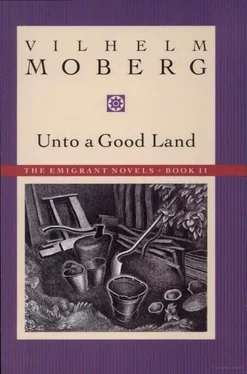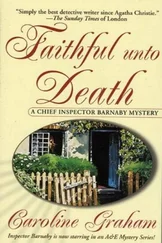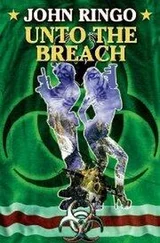The Finn said that this was a clipper ship from California, ready to sail for San Francisco. The ship was a new, fast sailer, sheathed in copper; the men on board were California bound, to dig for gold.
The ship’s name was Angelica, and from her prow hung a red, flapping pennant with jolly words: Ho! Ho! Ho! For California! This pennant did not resemble the flags on other ships, nor did the passengers resemble other ships’ passengers; these men were laughing, noisy, singing lusty songs. It seemed to the boys as though the ship had no command.
The Finn further informed the boys that a shipload of women, both white and colored, was to sail from New York for the gold fields. There was a scarcity of women throughout America, in San Francisco there were only fifty, and the gold diggers were said to be languishing from lust. Cases of attacks on mules and mares had been reported — woman hunger could drive men insane.
But there was plenty of gold out there, it grew in the earth as potatoes grow in Sweden. In the rivers they could fish for gold lumps, big as eggs. The Finn himself had seen samples of twenty-three carat California gold right here in New York. Beggars in California, of course, went about in rags, as did beggars the world over, but California beggars were dressed in glittering golden rags. A hundred ships had arrived in the port of San Francisco, and every crew member had run away to the gold fields. The gold would soon be spread all over the world, and in a few years the whole world would be rich.
But very few men returned alive from the gold fields. The Finn had heard that the passengers on the Angelica had ordered their tombstones in New York and were taking them along — this to save money, since it was cheaper to have them engraved here.
Robert came to new life, seeing and hearing about this clipper ship; he looked wonderingly and longingly at the Angelica. She wasn’t like the Charlotta, either in name or otherwise. She was a happy ship with happy passengers; as soon as the men finished one song they immediately started another:
Blow, boys, blow for California!
There’s plenty of gold,
So I’ve been told
On the banks of the Sacramento. .
The men waved, hats in hand, to the crowd on the pier. The passengers on the Swedish Charlotta also had sung, but mostly hymns, funeral hymns, and seldom had any of her passengers laughed. And while Robert didn’t understand the words of the songs from the Angelica, he didn’t think her passengers were singing hymns. Yet these singing gold diggers were traveling with their own engraved tombstones. How could people be so boisterous and happy, sailing with their tombstones? Perhaps, thought Robert, they were happy and sang because they were doing the wisest thing people can do in this world: their course might be perilous, but anyone wanting to get rich in America must, danger or no, head for the place where gold could be picked from the earth itself.
“They have fun on that boat,” said Arvid with a touch of envy.
“The men on the gold-rush ship are drunk,” explained the Finn. “I wouldn’t be surprised if they drink up their tombstones before they leave.”
The Angelica —Robert looked at the clipper ship’s stern where the name was painted. Angelica and Charlotta were two women’s names. Charlotta was heavy, hard, dour, stern, harsh, and commanding; Angelica easy, soft, light, and gay. Charlotta sounded like the name of a fat farm mistress, authoritative, masterful; Angelica like a tender, delicate girl, like a bird’s twitter in a flowering meadow early in spring; there was joy and freedom in that name.
The next ship he would travel on must have such a name.
Now the passengers on the clipper ship began jumping about in wild leaps.
“Those men must be dancing the polka,” said the Finn.
“What kind of dance is that?” asked Robert.
“It’s a new Hungarian war dance; in fact, an unchristian whore dance. Let’s get on, we’ve lots to see today.”
Reluctantly, Robert left the Angelica with her fluttering red banner; there were many hundreds of ships in the New York Harbor, but only one he wished to board.
They left the piers and turned off to the left, cut across the Battery, and went into town. If they wished to get a good view of Manhattan, the Finn said, they must go over to Weehawken; unfortunately, he didn’t have time to go with them, but once up there they could see thousands of houses and hundreds of churches; up there they could feel they were really seeing the world.
In his description book Robert had read about New York, and he knew it was the New World’s largest, most active town, that houses were six stories tall, and streets sometimes seventy-five feet wide. Now he wondered whether it were true that half of the inhabitants were murderers, robbers, and swindlers.
“It’s a little exaggerated,” said the Finn. “Only one-tenth are criminals.” And he added: It might be better to put it this way: every fourth house they passed was a saloon, every fifth woman they met was a whore, and every fifth man a criminal. Perhaps it would be better not to say exactly, but rather thereabouts, as far as a visiting seafarer could judge.
Robert began to inspect the people they met on the street more closely, particularly the younger women.
“Every fifth woman a whore, Mr. Mate?”
“Yes, maybe thereabouts, yes, just about.”
The Finn continued: There were in this town twenty thousand known and public sluts, besides all the private ones whom only God could count. There were two thousand whorehouses, open day and night, seven days of the week, except for the hours of service on Sundays. There were ten thousand saloons, and every saloon keeper had in his pay an undertaker, who came with his cart and dragged away the corpses of those who drank themselves to death. The American brännvin was the strongest in the world, and some saloon keepers even put a pinch of poison into the drink to make it smoother and more tasty; from childhood Americans had hardened themselves to spiced and poisoned drinks, but a foreigner might fall dead on the floor as he stood at the bar. In the most notorious nests, like the Old Brewery at Five Points, the saloon was on the first floor, the whorehouse on the second, and the morgue in the cellar. The guests got drunk in the saloon, then went upstairs to the girls, where they were robbed, murdered, undressed, and pushed through a chute to the morgue in the cellar. Yes, it was true, there were places here in New York where one was served speedily and efficiently. The police never dared go near such places. One den at Five Points had been demolished a few years ago when more than a thousand corpses were found.
Robert and Arvid felt their scalps tingle at the Finn’s stories. But, fortunately, remembered Robert, he carried nothing of value with him, and if you didn’t carry anything on a walk, you couldn’t be robbed. His inheritance had been used for the voyage, and only a few Swedish coppers remained in his purse.
But Arvid clutched the watch chain which hung across his vest and whispered into Robert’s ear: He had brought along his watch, perhaps it was risky, what should he do about it? Robert didn’t even have a watch; no one could rob him even though each tenth person was a thief.
The boys from Ljuder knew very little about towns. Before coming to New York, they had passed through only one town, Karlshamn. (Arvid had not even read about towns, as he couldn’t read; before Robert had shown him a geography schoolbook, he had thought the whole world consisted only of Sweden.) But the boys did not wish to appear ignorant, as though unused to people. Robert therefore asked the Finn, with an intonation reflecting familiarity with the subject: Were the women in the New York whorehouses born in this country or were they immigrants?
Читать дальше










